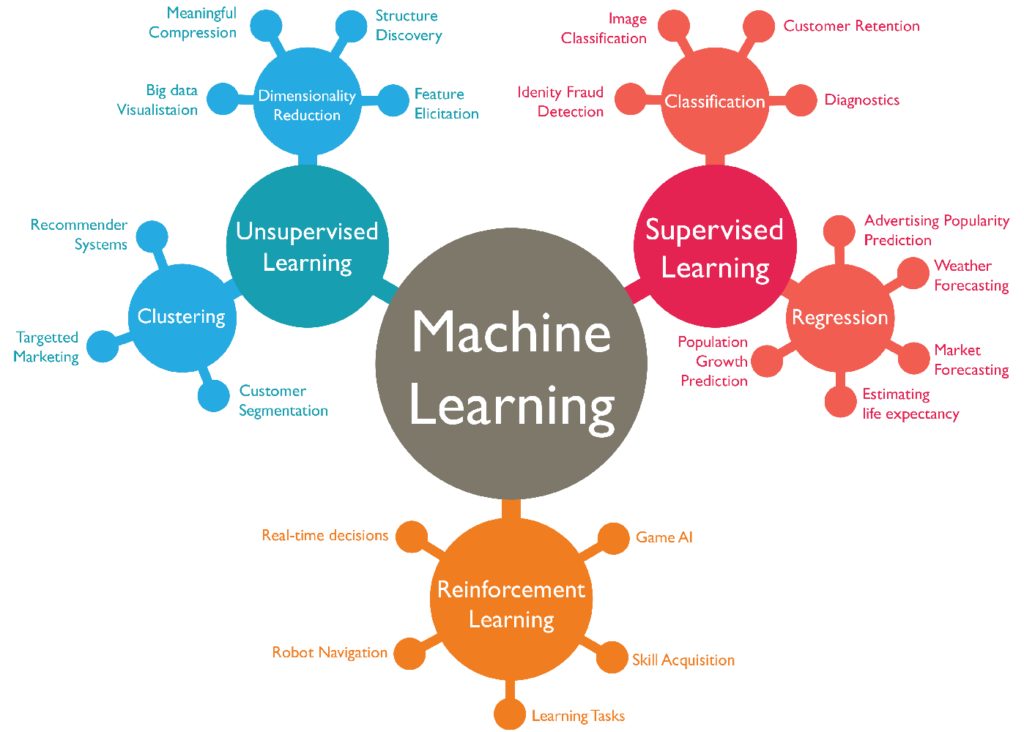
Course Content: Machine Learning Training in Jalandhar
Module 1: Introduction to Machine Learning
- What is Machine Learning?
- Types of Machine Learning (Supervised, Unsupervised, Reinforcement Learning)
- Machine Learning Workflow
- Tools and Software Setup (Python, Jupyter, scikit-learn)
Module 2: Data Preprocessing
- Data Cleaning and Handling Missing Values
- Data Transformation (Scaling, Encoding)
- Feature Engineering
- Data Splitting (Training, Validation, Testing)
Module 3: Supervised Learning
- Linear Regression
- Logistic Regression
- Decision Trees and Random Forest
- Support Vector Machines (SVM)
- k-Nearest Neighbors (k-NN)
- Model Evaluation Metrics (Accuracy, Precision, Recall, F1-score)
Module 4: Unsupervised Learning
- Clustering Algorithms (K-Means, Hierarchical)
- Dimensionality Reduction (Principal Component Analysis, t-SNE)
- Association Rule Mining
Module 5: Model Selection and Evaluation
- Cross-Validation Techniques (k-fold, Stratified, Leave-One-Out)
- Bias-Variance Tradeoff
- Hyperparameter Tuning (Grid Search, Random Search)
- Model Selection and Comparison
Module 6: Neural Networks and Deep Learning
- Introduction to Artificial Neural Networks
- Convolutional Neural Networks (CNNs)
- Recurrent Neural Networks (RNNs)
- Transfer Learning with Pretrained Models
- Practical Deep Learning Tips and Tricks
Module 7: Natural Language Processing (NLP)
- Text Preprocessing
- Word Embeddings (Word2Vec, GloVe)
- Sentiment Analysis
- Text Classification
- Named Entity Recognition (NER)
- Seq2Seq Models and Attention Mechanisms
Module 8: Reinforcement Learning (Optional)
- Introduction to Reinforcement Learning
- Markov Decision Processes
- Q-Learning and Deep Q Networks (DQN)
- Policy Gradient Methods
Module 9: Time Series Analysis
- Time Series Data
- ARIMA and Seasonal Decomposition
- Exponential Smoothing
- Forecasting Techniques
Module 10: Model Deployment and Productionization
- Model Deployment Strategies
- RESTful APIs for Model Deployment
- Containerization with Docker
- Orchestrating Containers with Kubernetes
Module 11: Ethics and Bias in Machine Learning
- Data Privacy and Security
- Bias and Fairness in Machine Learning
- Ethical Considerations
- Regulatory Compliance (e.g., GDPR)
Module 12: Real-world Projects and Case Studies
- Application of Machine Learning in Various Industries
- Hands-on Projects
- Case Studies and Practical Examples
Module 13: Advanced Topics (Optional)
- Bayesian Machine Learning
- Anomaly Detection
- Recommender Systems
- Advanced Deep Learning Architectures (e.g., GANs, Transformers)
Module 14: Capstone Project
- Real-world Machine Learning Project
- End-to-end Project Lifecycle
- Presentation and Documentation

Machine Learning Training Certification
Earn your certificate
Your certificate and skills are vital to the extent of jump-starting your career and giving you a chance to compete in a global space.
Share your achievement
Talk about it on Linkedin, Twitter, Facebook, boost your resume or frame it- tell your friend and colleagues about it.
Machine Learning Course Fee and Duration in Jalandhar
| Track | Regular Track | Weekend Track | Fast Track |
|---|---|---|---|
| Course Duration | 45 – 60 Days | 8 Weekends | 5 Days |
| Hours | 2 hours a day | 3 hours a day | 6+ hours a day |
| Training Mode | Live Classroom | Live Classroom | Live Classroom |